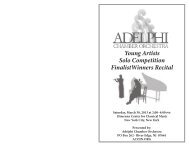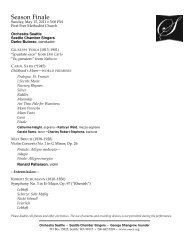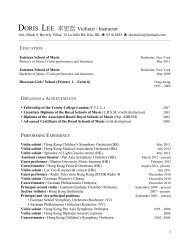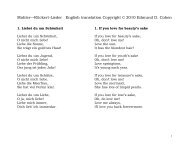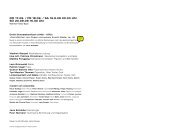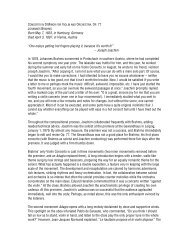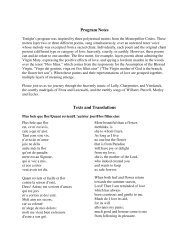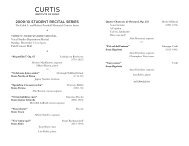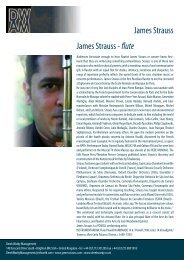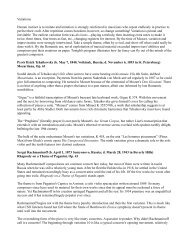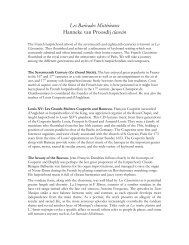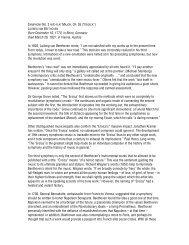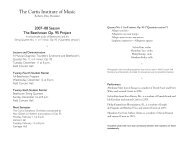Der fliegende Holländer - InstantEncore
Der fliegende Holländer - InstantEncore
Der fliegende Holländer - InstantEncore
You also want an ePaper? Increase the reach of your titles
YUMPU automatically turns print PDFs into web optimized ePapers that Google loves.
The slow, upward, dotted rhythmic<br />
surge of his prayer to his potential<br />
female redeemer, ‘Dich frage ich,<br />
gepries’ner Engel Gottes’, accompanied<br />
by woodwinds and tremolando strings,<br />
a calmer wave altogether, contrasts with<br />
his own theme, blatant octaves and fifths<br />
(conventionally the devil’s music!) stated<br />
at the start of the Overture by brass over<br />
tremolando strings. But this, too, gives<br />
way eventually to another related upwardpressing,<br />
dotted theme, ‘Wann alle Todten<br />
auferstehen’, as he declares that only the<br />
“total annihilation” of Judgement Day can<br />
Opera will never be<br />
the same again<br />
bring him peace. As each theme, each<br />
ever-darkening thought, seems increasingly<br />
to mirror the others thematically, we get a<br />
portrait of a man upon a wheel of fire; we feel<br />
that hope is as much a hell as hellfire itself,<br />
and the pain lurking within is more frightening<br />
than an entire cargo of ghouls. Desire and<br />
longing, by their very definition, whether<br />
for sexual love or for salvation, can never<br />
be fulfilled. This could be Ibsen, but fifty<br />
years before!<br />
And in all this, a new operatic framework<br />
is born. Music even in its structure and<br />
sound contains meaning, both for the<br />
actor/performer as subtextual character<br />
detail, and for the audience as signposts<br />
to psychological, physical or philosophical<br />
development. Music, both within the vocal<br />
line and rising from the pit, can act as<br />
contradiction or as a kind of counterpoint of<br />
interpretation to what we witness on stage,<br />
or to what is being said in the libretto. All of<br />
a sudden in this opera, a new theatre music<br />
begins to form, in which no detail stands<br />
alone and everything refers to something<br />
else or has a structural relationship to<br />
it. You can feel in The flying Dutchman,<br />
although tentatively employed here, what<br />
a massive formal tool this will become: a<br />
way of binding the orchestra to the action<br />
and allowing the music to take part in the<br />
debate of meaning, not rest as a mere<br />
accompaniment to it.<br />
Dutchmans 11<br />
Although you can certainly argue that<br />
in The flying Dutchman Wagner’s use of<br />
this technique, especially the Leitmotive<br />
(or leading themes), has not yet grown<br />
into a system, you can hear how certain<br />
repeated phrases are carefully structured<br />
to stimulate our imagination. One of the<br />
joys of hearing this piece – maybe even<br />
more striking in a concert version – is how<br />
Wagner is learning to use this new secret<br />
weapon: how he discovers this device<br />
that is to become his signature in the<br />
revolution of opera, believing, as he did,<br />
that opera deserves to become a serious<br />
art form, not a mere entertainment.<br />
As a result, sometimes you can hear the<br />
two worlds of old opera and new music<br />
drama at war in this score. Daland’s<br />
aria, for example, is an old-fashioned,<br />
sentimental ‘father’s aria’ from Auber<br />
or Spohr, sprinkled with a bit of Rocco<br />
from Fidelio (not without brilliantly dramatic<br />
disturbances as the old materialist is<br />
stopped in his greedy, tuneful tracks by<br />
the Dutchman’s intensity and Senta’s<br />
silent longing – the dormant sexual tension<br />
conveyed by heart-pounding timpani).<br />
Or if you contrast Erik’s Act II dream<br />
narration, punctuated or even driven by<br />
Senta’s questions, so modern in form<br />
because it is dealing with the power of<br />
the subconscious, with the earnest but<br />
slightly dated Cavatina that he sings<br />
in Act III to win her back, you can feel<br />
the new theatrical musical impulse<br />
challenging the old.<br />
LLO Dutchman_aw.indd 11 18/11/08 15:09:17



